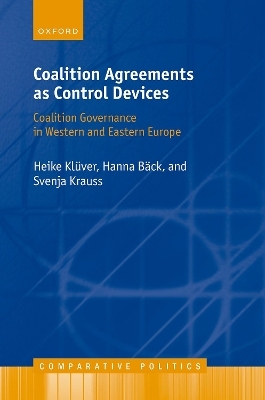
Coalition Agreements as Control Devices
Oxford University Press (Verlag)
978-0-19-289991-0 (ISBN)
Many coalition cabinets negotiate lengthy coalition contracts outlining the agenda for the time in office. Not only does negotiating these agreements take up time and resources, but compromises have to be made, which may result in cabinet conflicts and electoral costs. This book explores why political parties negotiate such agreements, and argues that coalition agreements are important control devices that allow coalition parties to keep their partners in line. The authors show that their use varies with the preference configuration in cabinet and the allocation of ministerial portfolios. First, they posit that parties will only negotiate policy issues in a coalition agreement when they disagree on these issues and when they are important to all partners. Second, since controlling a ministry provides parties with important information and policy-making advantages, parties use agreements to constrain their partners particularly when they control the ministry in charge of a policy area. Finally, they argue that coalition agreements only work as effective control devices if coalition parties settle controversial issues in these contracts. The COALITIONAGREE Dataset is used to evaluate the expectations set out in the book; the dataset maps the content of 229 coalition agreements that were negotiated by 189 parties between 1945 and 2015 in 24 Western and Eastern European countries. The results show that coalition parties systematically use agreements to control their partners when policy issues are divisive and salient and when they are confronted with a hostile minister. These agreements only effectively contain conflicts, however, when parties negotiate a compromise on precisely the issues that divide them.
Comparative Politics is a series for researchers, teachers, and students of political science that deals with contemporary government and politics. Global in scope, books in the series are characterized by a stress on comparative analysis and strong methodological rigour. The series is published in association with the European Consortium for Political Research. For more information visit: www.ecprnet.eu.
The series is edited by Nicole Bolleyer, Chair of Comparative Political Science, Geschwister Scholl Institut, LMU Munich and Jonathan Slapin, Professor of Political Institutions and European Politics, Department of Political Science, University of Zurich.
Heike Klüver is Full Professor and Chair of Comparative Political Behavior at Humboldt University Berlin. She previously held positions as Full Professor and Chair of Comparative Politics at the University of Hamburg, as Professor of Empirical Political Science at the University of Bamberg, as Assistant Professor at the University of Konstanz, and as a Postdoctoral Research Fellow at Nuffield College at the University of Oxford. She received her PhD from the University of Mannheim. Her research mainly focuses on political parties, coalition governments, and interest groups in European democracies, but she also works on topics related to political representation and political behavior more generally. Hanna Bäck is Professor of Political Science at Lund University. She received her PhD from Uppsala University, and has previously held a position as Junior Professor at the University of Mannheim, and as Postdoctoral Fellow at Twente University and the European University Institute. Her research mainly focuses on political parties, legislators, and governments in parliamentary democracies, but she also works on topics related to political psychology and political behavior. Svenja Krauss is a Postdoctoral Researcher in the Department of Government at the University of Vienna. She received her PhD from Humboldt University Berlin and was a DAAD lecturer before joining the University of Vienna. Her main research interests are coalition governments, political parties, and political behavior as well as political representation.
Part I. Coalition agreements and governing in coalitions
1: Introduction
2: Explaining the use of coalition agreements as control devices
Part II. The COALITIONAGREE Dataset
3: A new dataset mapping the content of coalition agreements
4: The content of coalition agreements
Part III. Why do governments negotiate coalition agreements?
5: Preference configuration and coalition agreements
6: Coalition agreements and ministerial portfolios
7: Do coalition agreements work?
Part IV. Conclusions and implications
8: Coalition agreements, multiparty governments, and democracy
Bibliography
Appendix 1: Overview of coalition cabinets
Appendix 2: Codebook
Appendix 3: Coding instructions
Index
| Erscheinungsdatum | 16.05.2023 |
|---|---|
| Reihe/Serie | Comparative Politics |
| Verlagsort | Oxford |
| Sprache | englisch |
| Maße | 165 x 240 mm |
| Gewicht | 618 g |
| Themenwelt | Sozialwissenschaften ► Politik / Verwaltung ► Politische Systeme |
| Sozialwissenschaften ► Politik / Verwaltung ► Staat / Verwaltung | |
| Sozialwissenschaften ► Politik / Verwaltung ► Vergleichende Politikwissenschaften | |
| ISBN-10 | 0-19-289991-0 / 0192899910 |
| ISBN-13 | 978-0-19-289991-0 / 9780192899910 |
| Zustand | Neuware |
| Informationen gemäß Produktsicherheitsverordnung (GPSR) | |
| Haben Sie eine Frage zum Produkt? |
aus dem Bereich


